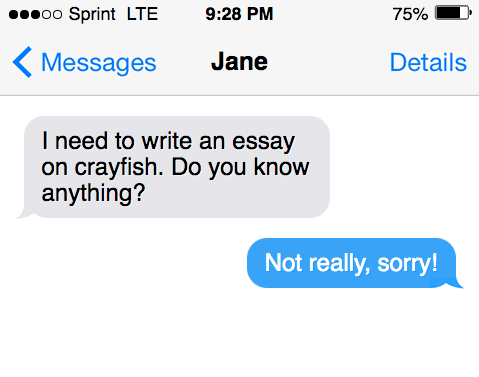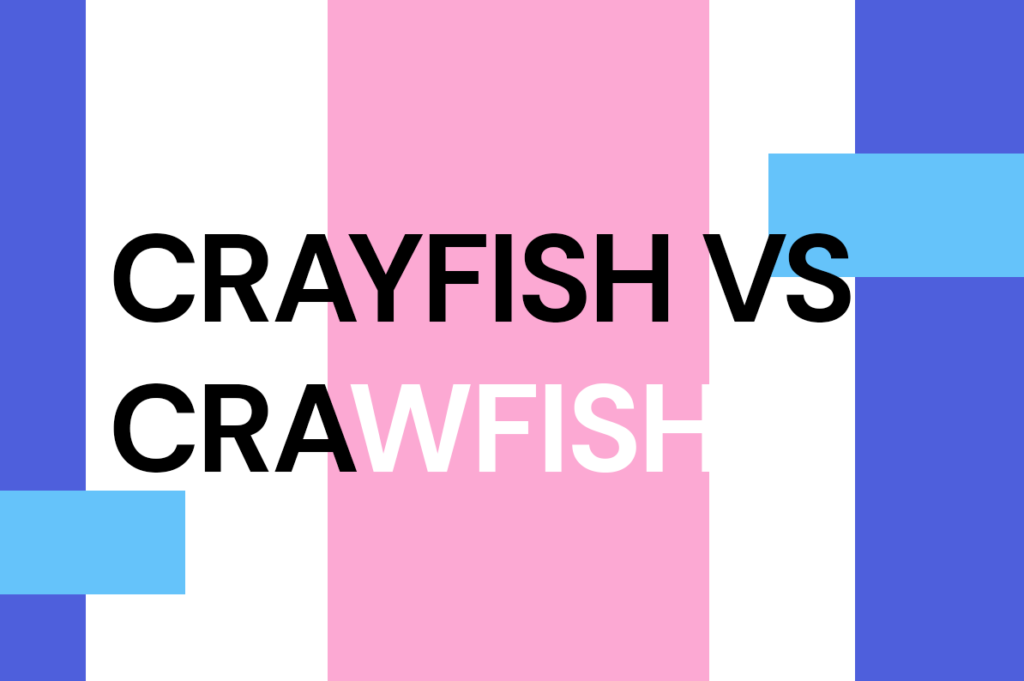Crayfish vs crawfish, which one is the right one to use? Why do people describe this animal in different ways? Are people referring to different animals? It can be confusing to hear or read both of these words and know if they’re referring to the same animal.
Read this short guide on understanding the differences between crayfish and crawfish…
What is a crayfish, crawfish, crawdad, and mud bug?
A crawfish is a crustacean that lives in both saltwater and freshwater environments. They are related to freshwater lobsters. The crawfish can be found all over the world. From the United States to South Africa, Singapore, Australia, and more.
This freshwater crustacean is also known as a mud bug, spiny lobster, rock lobster, yabby (Australia), yabbies (Australia), koura (Australia), and langoustes. The color of their shell can vary depending on the geography where the crustacean lives. It can be either a dark reddish brown or blueish green and pink. Most crayfish are red in color, although certain species look greenish-black or brown.
They have a dense, white flesh, similar to their cousin (although, not closely related), the lobster. They typically have a milder flavor than the lobster. And are sometimes considered an invasive species to certain water streams.
Crayfish is the standard spelling in the United States. And refers to the same animal, the crawfish. They are considered a “tasty treat” amongst many people across the world (from North America and Asia to Australia). Where only the claw meat is consumed by humans.

Crayfish, crawfish, crawdads, and mud bugs
Generally speaking, all of these words reference the same animal, the crayfish.
Difference between crayfish vs crawfish
—Understanding the key difference of crayfish vs crawfish
Crawfish is a dialectal variant of crayfish. It is referring to the same creature. The spelling is derived from the way the word is pronounced by English Speakers in the American South. In particular, this includes the Mississippi Delta, Arkansas, Oklahoma, and Kansas.
Crawfish has become accepted by American English speakers in context with the crayfish. For example, in a Cajun-style restaurant where someone could order a crawfish boil.
Here are examples of how crawfish gets used:
- “I can’t wait to go the crawfish boil and cry from all the spices that we eat.”
- “Free crawfish boil with every meal, this week only.”
- “We have the best crawfish, shrimp, mussels, and king crab legs in town!”
New Orleans, Louisiana is most known for using crawfish to describe the crustaceans. Although, the term crayfish originated from the french word escrevisse. This french word simply means, “crayfish” or small shellfish.
The different names that the crustacean is given typically has to deal with the geography of where the creatures are getting mentioned.

When to use Crayfish
Someone could use the term crayfish when they want to universally refer to the animal that dwells in lakes, ponds, and rivers across the world.
Using crayfish when writing American English is the correct word to use.
For example, “The crayfish is a small creature whose claws are eaten by Americans.”
When to use Crawfish
Someone could use the term crawfish when referring to the meal that is often prepared in the American South and American West Coast.
It is acceptable to use this spelling when using advertising, food menu’s, and other meal items that are related to the crayfish.
For example, “We are making a delicious crawfish soup, would you like some?”
Examples of use
Both crawfish and crayfish are acceptable to use in everyday speak across the United States. Both are considered standard American English and reference the same meaning, the crayfish animal.
The differences between the two are simply a dialect choice.
It would not be incorrect to use crawfish rather than crayfish when referring to the animal. Although, when writing American English research papers or college- and university-level essays, it’s best to use crayfish.
Examples of use
- “The crayfish is a creature that can be found around the world.”
- “Crayfish are omnivores.”
- “Sometimes, crayfish can become pets.”
- “The crawfish boil is taking place tomorrow, my family would like to attend.”
How to remember which word to use
By most standard terms, crayfish is the correct word to use. It is referencing the taxonomy, biology, and everyday reference of the animal. It is considered the standard term to speak about the crayfish animal.
While the difference between the two words isn’t significant, its is important to remember that someone can use crawfish when referring to the American Cajun food ways. In those cases, the crawfish term should get used to describe the meal or dish.
Sources
- Etymology, origin and meaning of crayfish by etymonline
- French Translation of “crayfish” – Collins Dictionary
- Crayfish/kōura: Invertebrates: Native animals: Conservation
- Common yabby – Wikipedia
- Lobsters, rock lobsters and crayfish
- definition of langoustes by The Free Dictionary
- crayfish | Description, Size, Habitat, Diet, & Facts – Britannica
- Cajun cuisine – Wikipedia
Inside this article
Fact checked:
Content is rigorously reviewed by a team of qualified and experienced fact checkers. Fact checkers review articles for factual accuracy, relevance, and timeliness. Learn more.
Core lessons
Glossary
- Abstract Noun
- Accusative Case
- Anecdote
- Antonym
- Active Sentence
- Adverb
- Adjective
- Allegory
- Alliteration
- Adjective Clause
- Adjective Phrase
- Ampersand
- Anastrophe
- Adverbial Clause
- Appositive Phrase
- Clause
- Compound Adjective
- Complex Sentence
- Compound Words
- Compound Predicate
- Common Noun
- Comparative Adjective
- Comparative and Superlative
- Compound Noun
- Compound Subject
- Compound Sentence
- Copular Verb
- Collective Noun
- Colloquialism
- Conciseness
- Consonance
- Conditional
- Concrete Noun
- Conjunction
- Conjugation
- Conditional Sentence
- Comma Splice
- Correlative Conjunction
- Coordinating Conjunction
- Coordinate Adjective
- Cumulative Adjective
- Dative Case
- Determiner
- Declarative Sentence
- Declarative Statement
- Direct Object Pronoun
- Direct Object
- Diction
- Diphthong
- Dangling Modifier
- Demonstrative Pronoun
- Demonstrative Adjective
- Direct Characterization
- Definite Article
- Doublespeak
- False Dilemma Fallacy
- Future Perfect Progressive
- Future Simple
- Future Perfect Continuous
- Future Perfect
- First Conditional
- Irregular Adjective
- Irregular Verb
- Imperative Sentence
- Indefinite Article
- Intransitive Verb
- Introductory Phrase
- Indefinite Pronoun
- Indirect Characterization
- Interrogative Sentence
- Intensive Pronoun
- Inanimate Object
- Indefinite Tense
- Infinitive Phrase
- Interjection
- Intensifier
- Infinitive
- Indicative Mood
- Participle
- Parallelism
- Prepositional Phrase
- Past Simple Tense
- Past Continuous Tense
- Past Perfect Tense
- Past Progressive Tense
- Present Simple Tense
- Present Perfect Tense
- Personal Pronoun
- Personification
- Persuasive Writing
- Parallel Structure
- Phrasal Verb
- Predicate Adjective
- Predicate Nominative
- Phonetic Language
- Plural Noun
- Punctuation
- Punctuation Marks
- Preposition
- Preposition of Place
- Parts of Speech
- Possessive Adjective
- Possessive Determiner
- Possessive Case
- Possessive Noun
- Proper Adjective
- Proper Noun
- Present Participle
- Prefix
- Predicate



